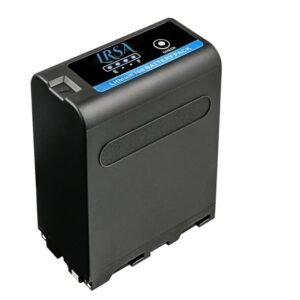LRSA VIDEO CAMERA BATTERY
A video camera battery is a rechargeable power source designed specifically for use with video cameras. These batteries are essential for providing the necessary energy to operate the camera and capture footage. Here are some key aspects of a video camera battery description:
Type of Battery:
-
- Lithium-ion (Li-ion) batteries are commonly used for video cameras due to their high energy density, light weight, and rechargeable nature.
- Nickel-metal hydride (NiMH) and nickel-cadmium (NiCd) batteries were used in the past but are less common today due to their lower energy density and environmental concerns.
-
Voltage:
- Video camera batteries typically operate at specific voltages, such as 3.7V, 7.2V, 14.4V, or 16.8V, depending on the camera model and requirements.
-
Capacity (mAh):
- Capacity is measured in milliampere-hours (mAh) and indicates how much energy the battery can store. Higher capacity batteries generally provide longer operating times.
- For example, a battery with a capacity of 2000mAh can theoretically provide 2000mA (or 2 amps) of current for one hour.
-
Compatibility:
- Video camera batteries are designed to be compatible with specific camera models or series. It’s important to use batteries recommended by the camera manufacturer to ensure proper performance and safety.
-
Form Factor:
- Video camera batteries come in various shapes and sizes, and their form factor is designed to fit into the battery compartment of specific cameras.
- Common form factors include rectangular, brick-shaped batteries or smaller, more compact designs.
-
Charging Method:
- Video camera batteries are rechargeable, and the charging method may vary. Some batteries can be charged while inside the camera, while others require a separate battery charger.
-
Charge Time:
- The time it takes to recharge a video camera battery depends on its capacity and the charging rate of the charger being used.
-
Memory Effect:
- Lithium-ion batteries are known for having little to no memory effect, meaning they can be recharged at any time without needing to be fully depleted first.
-
Safety Features:
- Modern video camera batteries often include safety features such as overcharge protection, over-discharge protection, and short-circuit protection to ensure safe and reliable operation.
-
Life Cycle:
- The number of charge-discharge cycles a battery can undergo before its capacity significantly diminishes. Lithium-ion batteries typically have a high number of cycles.
Always refer to the camera’s user manual and follow manufacturer recommendations for proper battery usage, charging, and maintenance to ensure optimal performance and longevity.




